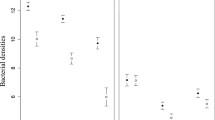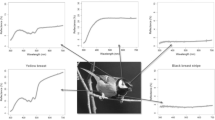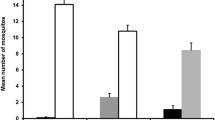Abstract
Avian plumage harbors various pathogens such as feather-degrading bacteria, which have the potential to reduce host fitness. A growing body of evidence suggests that the secretion of the uropygial gland of birds—preen oil—acts as one of the first lines of defence against harmful bacteria. However, previous studies on the antimicrobial impact of preen oil have yielded controversial results. The impact of preen oil on bacterial densities of feathers was experimentally investigated in two passerine species: great tits Parus major and pied flycatchers Ficedula hypoleuca. More specifically, we tested whether the antibacterial effect of the preen oil secreted by the same individual differs from that of the preen oil originating from the gland of other species. In the laboratory, ventral feathers were treated with preen oil from (1) an individual’s own gland, (2) from the gland of another passerine species, or (3) from the gland of a phylogenetically distant bird species. We detected a significant antibacterial effect of preen oil on bacteria that were attached to feathers, though the effect did not depend on whether the oil originated from the individual’s own gland or from the gland of another bird species. However, treatment with preen oil suppressed the density of bacteria more in the pied flycatcher than in the great tit. This is the first study providing experimental evidence that preen oil represents an important antimicrobial mechanism against those plumage bacteria that are attached to feathers.




Similar content being viewed by others
Data accessibility
Data are available as Supplementary Material.
References
Abbey-Lee RN, Araya-Ajoy YG, Mouchet A, Moiron M, Stuber EF, Kempenaers B, Dingemanse NJ (2018) Does perceived predation risk affect patterns of extra-pair paternity? A field experiment in a passerine bird. Funct Ecol 32:1001–1010. https://doi.org/10.1111/1365-2435.13052
Alt G, Saag P, Mägi M, Kisand V, Mänd R (2015) Manipulation of parental effort affects plumage bacterial load in a wild passerine. Oecologia 178:451–459. https://doi.org/10.1007/s00442-015-3238-1
Amo L, Avilés JM, Parejo D, Peña A, Rodríguez J, Tomás G (2012) Sex recognition by odour and variation in the uropygial gland secretion in starlings. J Anim Ecol 81:605–613. https://doi.org/10.1111/j.1365-2656.2011.01940.x
Barton LL, Northup DE (2011) Microbial ecology. Wiley, Hoboken
Baxter M, Trotter M (1969) The effect of fatty materials extracted from keratins on the growth of fungi, with particular reference to the free fatty acid content. J Med Vet Mycol 7:199–206. https://doi.org/10.1080/00362177085190361
Bisson I-A, Marra PP, Burtt EH Jr, Sikaroodi M, Gillevet PM (2009) Variation in plumage microbiota depends on season and migration. Microb Ecol 58:212. https://doi.org/10.1007/s00248-009-9490-3
Brush AH (1965) Energetics, temperature regulation and circulation in resting, active and defeathered California quail, Lophortyx californicus. Comp Biochem Physiol 15:399–421. https://doi.org/10.1016/0010-406x(65)90141-6
Burtt EH Jr, Ichida JM (1999) Occurrence of feather-degrading bacilli in the plumage of birds. Auk 116:364–372. https://doi.org/10.2307/4089371
Chiale MC, Montalti D, Flamini MA, Barbeito CG (2017) The uropygial gland of the Southern Caracara (Caracara plancus; Falconidae: Falconinae): histological and histochemical aspects. Acta Zool 98:245–251. https://doi.org/10.1111/azo.12171
Clayton DH (1999) Feather-busting bacteria. Auk 116:302–304. https://doi.org/10.2307/4089364
Cramp S, Perrins C (1993) Handbook of the birds of Europe, the Middle East and North Africa: the birds of the Western Palearctic: flycatchers to shrikes, vol 7. Oxford University Press, Oxford
Czirják GÁ, Møller AP, Mousseau TA, Heeb P (2010) Microorganisms associated with feathers of barn swallows in radioactively contaminated areas around chernobyl. Microb Ecol 60:373–380. https://doi.org/10.1007/s00248-010-9716-4
Czirják GÁ, Pap PL, Vágási CI, Giraudeau M, Mureşan C, Mirleau P, Heeb P (2013) Preen gland removal increases plumage bacterial load but not that of feather-degrading bacteria. Naturwissenschaften 100:145–151. https://doi.org/10.1007/s00114-012-1005-2
D’Alba L, Shawkey MD (2015) Mechanisms of antimicrobial defense in avian eggs. J Ornithol 156:399–408. https://doi.org/10.1007/s10336-015-1226-1
Fülöp A, Czirják GÁ, Pap PL, Vágási CI (2016) Feather-degrading bacteria, uropygial gland size and feather quality in House Sparrows Passer domesticus. Ibis 158:362–370. https://doi.org/10.1111/ibi.12342
Gibbs D, Barnes E, Cox J (2001) Pigeons and doves: a guide to the pigeons and doves of the world. Yale University Press, New Haven
Giraudeau M, Czirják G, Duval C, Bretagnolle V, Gutierrez C, Guillon N, Heeb P (2013) Effect of preen oil on plumage bacteria: an experimental test with the mallard. Behav Process 92:1–5. https://doi.org/10.1016/j.beproc.2012.08.001
Goldstein G, Flory KR, Browne BA, Majid S, Ichida JM, Burtt EH Jr (2004) Bacterial degradation of black and white feathers. Auk 121:656–659. https://doi.org/10.2307/4090304
Goodenough AE, Stallwood B (2010) Intraspecific variation and interspecific differences in the bacterial and fungal assemblages of blue tit (Cyanistes caeruleus) and great tit (Parus major) nests. Microb Ecol 59:221–232. https://doi.org/10.1007/s00248-009-9591-z
Gunderson AR, Forsyth MH, Swaddle JP (2009) Evidence that plumage bacteria influence feather coloration and body condition of eastern bluebirds Sialia sialis. J Avian Biol 40:440–447. https://doi.org/10.1111/j.1600-048x.2008.04650.x
Hagemeijer EJM, Blair MJ (1997) The EBCC Atlas of European breeding birds: their distribution and abundance. Poyser, London
Haribal M, Dhondt AA, Rosane D, Rodriguez E (2005) Chemistry of preen gland secretions of passerines: different pathways to same goal? why? Chemoecology 15:251–260. https://doi.org/10.1007/s00049-005-0318-4
Haribal M, Dhondt A, Rodriguez E (2009) Diversity in chemical compositions of preen gland secretions of tropical birds. Biochem Syst Ecol 37:80–90. https://doi.org/10.1016/j.bse.2008.12.005
Hart BL (1997) Behavioural defence. In: Clayton DH, Moore J (eds) Host-parasite evolution: general principles and avian models. Oxford University Press, Oxford, pp 59–77
Huang R, Li M, Gregory RL (2011) Bacterial interactions in dental biofilm. Virulence 2:435–444. https://doi.org/10.4161/viru.2.5.16140
Ichida JM, Krizova L, LeFevre CA, Keener HM, Elwell DL, Burtt EH Jr (2001) Bacterial inoculum enhances keratin degradation and biofilm formation in poultry compost. J Microbiol Methods 47:199–208. https://doi.org/10.1016/s0167-7012(01)00302-5
Jacob J, Ziswiler V (1982) The uropygial gland. In: Farner DS, King JR, Parkes KC (eds) Avian biology, vol 6. Academic Press, New York, pp 199–324
Jacob S, Immer A, Leclaire S, Parthuisot N, Ducamp C, Espinasse G, Heeb P (2014) Uropygial gland size and composition varies according to experimentally modified microbiome in great tits. BMC Evol Biol 14:134. https://doi.org/10.1186/1471-2148-14-134
Kilgas P, Saag P, Mägi M, Edenberg M, Tilgar V, Mänd R (2012a) Variation in assemblages of feather bacteria in relation to plumage color in female great tits. Condor 114:606–611. https://doi.org/10.1525/cond.2012.110103
Kilgas P, Saag P, Mägi M, Tilgar V, Mänd R (2012b) Plumage bacterial load increases during nest-building in a passerine bird. J Ornithol 153:833–838. https://doi.org/10.1007/s10336-011-0801-3
Kirchman DL (2012) Processes in microbial ecology. Oxford University Press, Oxford
Kuznetsova A, Brockhoff PB, Christensen RH (2017) lmerTest package: tests in linear mixed effects models. J Stat Softw 82:1–26. https://doi.org/10.18637/jss.v082.i13
Leclaire S, Pierret P, Chatelain M, Gasparini J (2014) Feather bacterial load affects plumage condition, iridescent color, and investment in preening in pigeons. Behav Ecol 25:1192–1198. https://doi.org/10.1093/beheco/aru109
Lenth RV (2014) lsmeans: least-squares means. R package version 2.00-5
Lucas FS, Bertru G, Höfle MG (2003) Characterization of free-living and attached bacteria in sediments colonized by Hediste diversicolor. Aquat Microb Ecol 32:165–174. https://doi.org/10.3354/ame032165
Lucas FS, Moureau B, Jourdie V, Heeb P (2005) Brood size modifications affect plumage bacterial assemblages of European starlings. Mol Ecol 14:639–646. https://doi.org/10.1111/j.1365-294x.2005.02436.x
Lundberg A, Alatalo RV (2010) The pied flycatcher. Poyser, London
Mägi M, Mänd R (2004) Habitat differences in allocation of eggs between successive breeding attempts in great tits (Parus major). Ecoscience 11:361–369. https://doi.org/10.1080/11956860.2004.11682843
Mänd R, Tilgar V, Lõhmus A, Leivits A (2005) Providing nest boxes for hole-nesting birds—does habitat matter? Biodivers Conserv 14:1823–1840. https://doi.org/10.1007/s10531-004-1039-7
Martín-Platero AM, Valdivia E, Ruíz-Rodríguez M, Soler JJ, Martín-Vivaldi M, Maqueda M, Martínez-Bueno M (2006) Characterization of antimicrobial substances produced by Enterococcus faecalis MRR 10-3, isolated from the uropygial gland of the hoopoe (Upupa epops). Appl Environ Microbiol 72:4245–4249. https://doi.org/10.1128/aem.02940-05
Martín-Vivaldi M, Ruiz-Rodríguez M, Soler JJ, Peralta-Sánchez JM, Méndez M, Valdivia E, Martín-Platero AM, Martínez-Bueno M (2009) Seasonal, sexual and developmental differences in hoopoe Upupa epops preen gland morphology and secretions: evidence for a role of bacteria. J Avian Biol 40:191–205. https://doi.org/10.1111/j.1600-048x.2009.04393.x
Merilä J, Hemborg C (2000) Fitness and feather wear in the collared flycatcher Ficedula albicollis. J Avian Biol 31:504–510. https://doi.org/10.1034/j.1600-048x.2000.310410.x
Mohit V, Archambault P, Toupoint N, Lovejoy C (2014) Phylogenetic differences in attached and free-living bacterial communities in a temperate coastal lagoon during summer, revealed via high-throughput 16S rRNA gene sequencing. Appl Environ Microbiol 80:2071–2083. https://doi.org/10.1128/aem.02916-13
Møller AP, Czirjak GÁ, Heeb P (2009) Feather micro-organisms and uropygial antimicrobial defences in a colonial passerine bird. Funct Ecol 23:1097–1102. https://doi.org/10.1111/j.1365-2435.2009.01594.x
Møller AP, Peralta-Sánchez JM, Nielsen JT, López-Hernández E, Soler JJ (2012) Goshawk prey have more bacteria than non-prey. J Anim Ecol 81:403–410. https://doi.org/10.1111/j.1365-2656.2011.01923.x
Montalti D, Gutiérrez AM, Reboredo G, Salibián A (2005) The chemical composition of the uropygial gland secretion of rock dove Columba livia. Comp Biochem Physiol A 140:275–279. https://doi.org/10.1016/j.cbpb.2004.10.008
Moreno-Rueda G (2010) Uropygial gland size correlates with feather holes, body condition and wingbar size in the house sparrow Passer domesticus. J Avian Biol 41:229–236. https://doi.org/10.1111/j.1600-048x.2009.04859.x
Moreno-Rueda G (2014) Uropygial gland size, feather holes and moult performance in the House Sparrow Passer domesticus. Ibis 156:457–460. https://doi.org/10.1111/ibi.12131
Moreno-Rueda G (2015) Body-mass-dependent trade-off between immune response and uropygial gland size in house sparrows Passer domesticus. J Avian Biol 46:40–45. https://doi.org/10.1111/jav.00358
Moreno-Rueda G (2016) Uropygial gland and bib colouration in the house sparrow. PeerJ 4:e2102. https://doi.org/10.7717/peerj.2102
Moreno-Rueda G (2017) Preen oil and bird fitness: a critical review of the evidence. Biol Rev 92:2131–2143. https://doi.org/10.1111/brv.12324
Muza MM, Burtt EH Jr, Ichida JM (2000) Distribution of bacteria on feathers of some eastern North American birds. Wilson Bull 112:432–435. https://doi.org/10.1676/0043-5643(2000)112%5b0432:dobofo%5d2.0.co;2
Ozawa T, Yamaguchi M (1986) Fractionation and estimation of particle-attached and unattached Bradyrhizobium japonicum strains in soils. Appl Environ Microbiol 52:911–914
Pan H, Zhang Y, He G-X, Katagori N, Chen H (2014) A comparison of conventional methods for the quantification of bacterial cells after exposure to metal oxide nanoparticles. BMC Microbiol 14:222. https://doi.org/10.1186/s12866-014-0222-6
Pap PL, Vágási CI, Osváth G, Mureşan C, Barta Z (2010) Seasonality in the uropygial gland size and feather mite abundance in house sparrows Passer domesticus: natural covariation and an experiment. J Avian Biol 41:653–661. https://doi.org/10.1111/j.1600-048x.2010.05146.x
Pugh GJF (1972) The contamination of birds’ feathers by fungi. Ibis 114:172–177. https://doi.org/10.1111/j.1474-919x.1972.tb02602.x
Pugh GJF, Evans MD (1970) Keratinophilic fungi associated with birds: II. Physiological studies. Trans Br Mycol Soc 54:241–250. https://doi.org/10.1016/s0007-1536(70)80037-7
R Development Core Team (2018) R: a language and environment for statistical computing. R Foundation for Statistical Computing, Vienna
Reneerkens J, Piersma T, Damsté JSS (2002) Sandpipers (Scolopacidae) switch from monoester to diester preen waxes during courtship and incubation, but why? Proc R Soc Lond B Biol Sci 269:2135–2139. https://doi.org/10.1098/rspb.2002.2132
Reneerkens J, Piersma T, Damsté JSS (2005) Switch to diester preen waxes may reduce avian nest predation by mammalian predators using olfactory cues. J Exp Biol 208:4199–4202. https://doi.org/10.1242/jeb.01872
Reneerkens J, Versteegh MA, Schneider AM, Piersma T, Burtt EH Jr (2008) Seasonally changing preen-wax composition: red knots’ (Calidris canutus) flexible defense against feather-degrading bacteria. Auk 125:285–290. https://doi.org/10.1525/auk.2008.06217
Ribet D, Cossart P (2015) How bacterial pathogens colonize their hosts and invade deeper tissues. Microbes Infect 17:173–183. https://doi.org/10.1016/j.micinf.2015.01.004
Ruiz-De-Castañeda R, Burtt EH Jr, González-Braojos S, Moreno J (2012) Bacterial degradability of an intrafeather unmelanized ornament: a role for feather-degrading bacteria in sexual selection? Biol J Linn Soc 105:409–419. https://doi.org/10.1111/j.1095-8312.2011.01806.x
Ruiz-Rodríguez M, Valdivia E, Soler JJ, Martín-Vivaldi M, Martín-Platero AM, Martínez-Bueno M (2009) Symbiotic bacteria living in the hoopoe’s uropygial gland prevent feather degradation. J Exp Biol 212:3621–3626. https://doi.org/10.1242/jeb.031336
Ruiz-Rodríguez M, Tomás G, Martín-Gálvez D, Ruiz-Castellano C, Soler JJ (2015) Bacteria and the evolution of honest signals. The case of ornamental throat feathers in spotless starlings. Funct Ecol 29:701–709. https://doi.org/10.1111/1365-2435.12376
Saag P, Mänd R, Tilgar V, Kilgas P, Mägi M, Rasmann E (2011a) Plumage bacterial load is related to species, sex, biometrics and fledging success in co-occurring cavity-breeding passerines. Acta Ornithol 46:191–201. https://doi.org/10.3161/000164511x62596
Saag P, Tilgar V, Mänd R, Kilgas P, Mägi M (2011b) Plumage bacterial assemblages in a breeding wild passerine: relationships with ecological factors and body condition. Microb Ecol 61:740–749. https://doi.org/10.1007/s00248-010-9789-0
Saag P, Kilgas P, Mägi M, Tilgar V, Mänd R (2012) Inter-annual and body topographic consistency in the plumage bacterial load of great tits. J Field Ornithol 83:94–100. https://doi.org/10.1111/j.1557-9263.2011.00359.x
Selje N, Simon M (2003) Composition and dynamics of particle-associated and free-living bacterial communities in the Weser estuary, Germany. Aquat Microb Ecol 30:221–237. https://doi.org/10.3354/ame030221
Shawkey MD, Pillai SR, Hill GE (2003) Chemical warfare? effects of uropygial oil on feather-degrading bacteria. J Avian Biol 34:345–349. https://doi.org/10.1111/j.0908-8857.2003.03193.x
Shawkey MD, Mills KL, Dale C, Hill GE (2005) Microbial diversity of wild bird feathers revealed through culture-based and culture-independent techniques. Microb Ecol 50:40–47. https://doi.org/10.1007/s00248-004-0089-4
Shawkey MD, Hussain MJ, Strong AL, Hagelin JC, Vollmer AC, Hill GE (2006) Use of culture-independent methods to compare bacterial assemblages on feathers of crested and least auklets (Aethia cristatella and Aethia pusilla) with those of passerines. Waterbirds 29:507–511. https://doi.org/10.1675/1524-4695(2006)29%5b507:uocmtc%5d2.0.co;2
Shawkey MD, Pillai SR, Hill GE, Siefferman LM, Roberts SR (2007) Bacteria as an agent for change in structural plumage color: correlational and experimental evidence. Am Nat 169:S112–S121. https://doi.org/10.1086/510100
Shawkey MD, Pillai SR, Hill GE (2009) Do feather-degrading bacteria affect sexually selected plumage color? Naturwissenschaften 96:123–128. https://doi.org/10.1007/s00114-008-0462-0
Soler JJ, Martín-Vivaldi M, Ruiz-Rodríguez M, Valdivia E, Martín-Platero AM, Martínez-Bueno M, Peralta-Sánchez JM, Méndez M (2008) Symbiotic association between hoopoes and antibiotic-producing bacteria that live in their uropygial gland. Funct Ecol 22:864–871. https://doi.org/10.1111/j.1365-2435.2008.01448.x
Soler JJ, Peralta-Sánchez JM, Martín-Platero AM, Martín-Vivaldi M, Martínez-Bueno M, Møller AP (2012) The evolution of size of the uropygial gland: mutualistic feather mites and uropygial secretion reduce bacterial loads of eggshells and hatching failures of European birds. J Evol Biol 25:1779–1791. https://doi.org/10.1111/j.1420-9101.2012.02561.x
Sorci G (2013) Immunity, resistance and tolerance in bird–parasite interactions. Parasite Immunol 35:350–361. https://doi.org/10.1111/pim.12047
Stettenheim PR (2000) The integumentary morphology of modern birds—an overview. Am Zool 40:461–477. https://doi.org/10.1668/0003-1569(2000)040%5b0461:timomb%5d2.0.co;2
Swaddle JP, Witter MS, Cuthill IC, Budden A, McCowen P (1996) Plumage condition affects flight performance in common starlings: implications for developmental homeostasis, abrasion and moult. J Avian Biol 27:103–111. https://doi.org/10.2307/3677139
Vincze O, Vágási CI, Kovács I, Galván I, Pap PL (2013) Sources of variation in uropygial gland size in European birds. Biol J Linn Soc 110:543–563. https://doi.org/10.1111/bij.12139
Whittaker DJ, Soini HA, Atwell JW, Hollars C, Novotny MV, Ketterson ED (2010) Songbird chemosignals: volatile compounds in preen gland secretions vary among individuals, sexes, and populations. Behav Ecol 21:608–614. https://doi.org/10.1093/beheco/arq033
Acknowledgements
We thank Pauli Saag and Aile Sumberg for their assistance and Tiina Alamäe and Helena Andreson for help in the interpretation of the results. The study was financially supported by the Estonian Research Council (research Grants # IUT34-8 and PUTJD700). MM and JL thank the Estonian Government for continuously keeping up our hopes about raising research funding to 1% of GDP.
Author information
Authors and Affiliations
Contributions
RM, GA and MM conceived the ideas and designed the methodology. GA and MM collected the field samples and performed the laboratory analyses. JL, MM and GA analyzed the data. GA and RM led the writing of the manuscript. MM and JL contributed to the writing of the manuscript.
Corresponding author
Ethics declarations
Ethical approval
All applicable international, national, and/or institutional guidelines for the care and use of animals were followed. The study complies with the current laws of Estonia and was approved by the Animal Procedures Committee (licence no 106) of the Estonian Ministry of Agriculture.
Conflict of interest
The authors declare that they have no conflict of interest.
Additional information
Communicated by Indrikis Krams.
Electronic supplementary material
Below is the link to the electronic supplementary material.
Rights and permissions
About this article
Cite this article
Alt, G., Mägi, M., Lodjak, J. et al. Experimental study of the effect of preen oil against feather bacteria in passerine birds. Oecologia 192, 723–733 (2020). https://doi.org/10.1007/s00442-020-04599-8
Received:
Accepted:
Published:
Issue Date:
DOI: https://doi.org/10.1007/s00442-020-04599-8




